Top Rankings
Lincoln-Sudbury School District ranks among the top 20% of public school district in Massachusetts for:
Category
Attribute
Overall Rank
Highest overall rank (Top 1%)
Math Proficiency
Highest math proficiency (Top 1%)
Reading/Language Arts Proficiency
Highest reading/language arts proficiency (Top 1%)
Science Proficiency
Highest science proficiency (Top 10%)
Graduation Rate
Highest graduation rate (Top 10%)
For the 2025 school year, there is 1 public school serving 1,462 students in Lincoln-Sudbury School District. This district's average testing ranking is 10/10, which is in the top 1% of public schools in Massachusetts.
Public School in Lincoln-Sudbury School District have an average math proficiency score of 78% (versus the Massachusetts public school average of 42%), and reading proficiency score of 81% (versus the 45% statewide average).
Minority enrollment is 30% of the student body (majority Asian and Hispanic), which is less than the Massachusetts public school average of 47% (majority Hispanic).
Overview
This School District
This State (MA)
# Schools
1 School
1,837 Schools
# Students
1,462 Students
916,334 Students
# Teachers
129 Teachers
77,716 Teachers
Student : Teacher Ratio
11:1
11:1
District Rank
Lincoln-Sudbury School District, which is ranked within the top 1% of all 393 school districts in Massachusetts (based off of combined math and reading proficiency testing data) for the 2021-2022 school year.
The school district's graduation rate of 97% has stayed relatively flat over five school years.
Overall District Rank
#2 out of 397 school districts
(Top 1%)
(Top 1%)
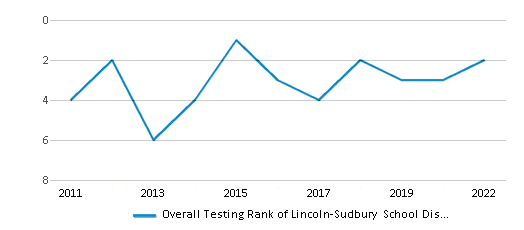
Math Test Scores (% Proficient)
78%
41%
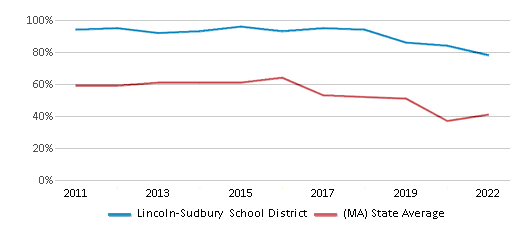
Reading/Language Arts Test Scores (% Proficient)
81%
44%
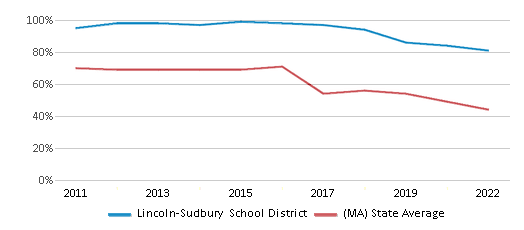
Science Test Scores (% Proficient)
73%
44%
Graduation Rate
97%
90%
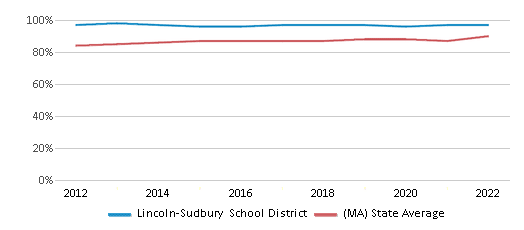
Students by Ethnicity:
Diversity Score
0.49
0.65
# American Indian Students
1 Student
2,192 Students
% American Indian Students
n/a
n/a
# Asian Students
131 Students
67,818 Students
% Asian Students
9%
7%
# Hispanic Students
100 Students
230,769 Students
% Hispanic Students
7%
25%
# Black Students
77 Students
88,074 Students
% Black Students
6%
10%
# White Students
1,027 Students
483,656 Students
% White Students
70%
53%
# Hawaiian Students
3 Students
785 Students
% Hawaiian Students
n/a
n/a
# Two or more races Students
116 Students
41,339 Students
% of Two or more races Students
8%
5%
Students by Grade:
# Students in PK Grade:
-
32,288
# Students in K Grade:
-
62,105
# Students in 1st Grade:
-
64,458
# Students in 2nd Grade:
-
66,664
# Students in 3rd Grade:
-
64,731
# Students in 4th Grade:
-
65,978
# Students in 5th Grade:
-
67,142
# Students in 6th Grade:
-
67,086
# Students in 7th Grade:
-
68,011
# Students in 8th Grade:
-
68,221
# Students in 9th Grade:
347
73,757
# Students in 10th Grade:
380
73,439
# Students in 11th Grade:
386
71,886
# Students in 12th Grade:
346
68,770
# Ungraded Students:
3
1,798
District Revenue and Spending
The revenue/student of $29,294 is higher than the state median of $23,845. The school district revenue/student has stayed relatively flat over four school years.
The school district's spending/student of $28,579 is higher than the state median of $24,602. The school district spending/student has stayed relatively flat over four school years.
Total Revenue
$43 MM
$21,850 MM
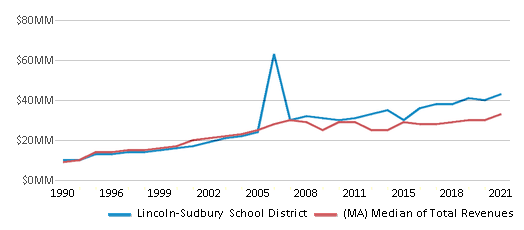
Spending
$42 MM
$22,544 MM
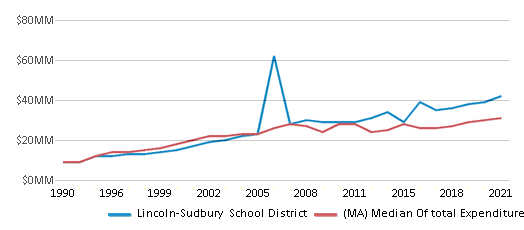
Revenue / Student
$29,294
$23,845
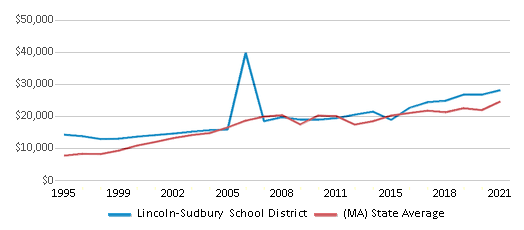
Spending / Student
$28,579
$24,602
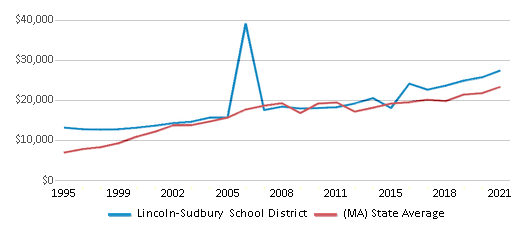
Best Lincoln-Sudbury School District Public Schools (2025)
School
(Math and Reading Proficiency)
(Math and Reading Proficiency)
Location
Grades
Students
Rank: #11.
Lincoln-sudbury Regional High School
(Math: 78% | Reading: 81%)
Rank:
Rank:
10/
Top 5%10
390 Lincoln Rd
Sudbury, MA 01776
(978) 443-9961
Sudbury, MA 01776
(978) 443-9961
Grades: 9-12
| 1,462 students
Frequently Asked Questions
How many schools belong to Lincoln-Sudbury School District?
Lincoln-Sudbury School District manages 1 public schools serving 1,462 students.
What is the rank of Lincoln-Sudbury School District?
Lincoln-Sudbury School District is ranked #2 out of 393 school districts in Massachusetts (top 1%) based off of combined math and reading proficiency testing data for the 2021-2022 school year. This district ranks in the top 20% of Massachusetts school districts for: Highest overall rank (Top 1%), Highest math proficiency (Top 1%), Highest reading/language arts proficiency (Top 1%), Highest science proficiency (Top 10%) and Highest graduation rate (Top 10%)
What is the racial composition of students in Lincoln-Sudbury School District?
70% of Lincoln-Sudbury School District students are White, 9% of students are Asian, 8% of students are Two or more races, 7% of students are Hispanic, and 6% of students are Black.
What is the student/teacher ratio of Lincoln-Sudbury School District?
Lincoln-Sudbury School District has a student/teacher ratio of 11:1, which is lower than the Massachusetts state average of 12:1.
What is Lincoln-Sudbury School District's spending/student ratio?
The school district's spending/student of $28,579 is higher than the state median of $24,602. The school district spending/student has stayed relatively flat over four school years.
Recent Articles

What Is A Charter School?
Explore the world of charter schools in this comprehensive guide. Learn about their history, how they operate, and the pros and cons of this educational innovation. Discover key facts about charter schools, including admission policies, demographics, and funding, as well as what to look for when considering a charter school for your child.

10 Reasons Why High School Sports Benefit Students
Discover the 10 compelling reasons why high school sports are beneficial for students. This comprehensive article explores how athletics enhance academic performance, foster personal growth, and develop crucial life skills. From improved fitness and time management to leadership development and community representation, learn why participating in high school sports can be a game-changer for students' overall success and well-being.

February 05, 2025
Understanding the U.S. Department of Education: Structure, Impact, and EvolutionWe explore how the Department of Education shapes American education, from its cabinet-level leadership to its impact on millions of students, written for general audiences seeking clarity on this vital institution.





